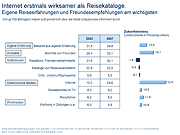For the first time, the internet is more effective than travel brochures.
Futurist Opaschowski: "Travel agencies must become experience providers""
A new era of travel has begun in the internet age. More and more tour operators, airlines, and holiday hotels have an online presence, allowing bookings and information to be accessed from home. Consumer reluctance has come to an end. Internet usage has practically doubled in the last four years: from 12.2 percent of the population in 2003 to 24.6 percent last year. This is according to a recent representative survey conducted by the BAT Foundation for Future Issues, in which 2,000 people aged 14 and over were asked about their most important sources of information for making travel decisions.
For the first time in the history of modern tourism, the internet has caught up with and surpassed traditional travel catalogs (22.5%) in importance as a decision-making tool for vacationers. "Tour operators will have to fundamentally rethink their budgets for information and advertising," says Prof. Dr. Horst W. Opaschowski, Scientific Director of the Future Foundation. "The costs of expensive, glossy publications become questionable when other advertising media on the internet, television, and in newspapers are now more effective." Tourist offices and travel agencies face a similar challenge, as local and accommodation brochures are becoming almost irrelevant for travel decisions (5.5%).
The continued use of local brochures and travel catalogs is supported by the still-existing generational gap in internet usage. The proportion of young internet users who make travel decisions is more than three times higher (38.51 million) than that of the 55+ generation (11.21 million). While travel catalogs (22.21 million) and local brochures (6.01 million) still hold significance for the older generation, this practice is increasingly being questioned. The appeal of electronic information media, especially among those over 55, is growing exponentially (2003: 2.71 million – 2007: 11.21 million), significantly surpassing the informational value of local brochures. Opaschowski: "From the public's perspective, the advantages of the internet are constantly increasing: The diversity of information, its up-to-dateness, and the ability to obtain information around the clock without having to book immediately are all important factors."„
Personal travel experiences and recommendations from friends are most important.
Despite the rapid technological advancements of the internet age, one thing remains remarkable: personal travel experiences and the stories and reports of friends are irreplaceable by any other source of information. Positive vacation experiences render many advertising campaigns at home unnecessary. Personal travel experiences and recommendations from friends are becoming increasingly important. As in all aspects of life, machines cannot replace people, which is why travel agencies remain indispensable sources of information and communication. Professor Opaschowski states: "A future trend is emerging: everyone will become their own travel agency! Therefore, the travel agency of the future must focus more on contact and personal interaction with the customer, offering more experiential travel than simply booking online. Whether with or without sand and palm trees, the anticipation of the vacation begins the moment you step into a travel agency." The travel agency will not become obsolete in the internet age. As a service, experience, and booking agency, it continues to have a bright future.



